See this film: “Fish Tank” (2009)
27 February 2011
Remember being 15? Everyone seems like such an asshole, and no one’s more of a douche than you. Interactions with your mom amount to screaming matches. Seems like nothing’s going to get better, either. Your hair won’t do what you want and your body’s all over the place — childish in parts and alarmingly womanly in others. Your entire world seems small, stupid. If you’re lucky, you have one thing you’re good at. In Andrea Arnold’s spectacular Fish Tank, Mia (Katie Jarvis)’s one thing is hip-hop dancing. She sneaks upstairs in their depressing council estate flat to an empty apartment, turns on the music, and works on perfecting her moves. I can’t remember seeing a film like this that shows us the world through the eyes of a 15-year-old so intimately — we’re always with Mia, sharing that lonely, locked-in feeling with her, never looking at her. It’s an extraordinary way to put the viewer into a 15-year-old’s head. 
Things shift when suddenly her very young single mother Joanne has a new man in her life — Connor (Michael Fassbender), an Irish guy who just doesn’t fit into the council estate world. He’s so cute, has a middle-class job and a practical man’s car, and expresses such paternal ease and a light touch with Mia and her little sister: what’s he doing with the trashy, foul-mouthed Joanne? And here’s where Arnold captures Mia so perfectly. She doesn’t know whether she wants to flirt with Connor or turn him into the father figure who’d give their lives more stability; she wants both, of course. Because we see everything through Mia’s eyes, we wonder whether Connor is sending mixed signals — and we’re a bit alarmed to realize that we hope he is, even as a sense of unease grows about this seemingly nice guy.
When you’re 15, anything can happen to you — and Mia’s clearly on that precipice. Teenage pregnancy and/or rape are more likely in her precarious world than education or another path to mobility. When she looks at her improbably blonde, half-dressed, alcoholic mother, we know a lot of the venom between them results from the fact that they both know Mia might follow that path too. That’s why her hip-hop dancing is so evocative. It might be private, almost secret, but it gives her power and control over her lanky 15-year-old limbs. Yet being a good dancer gives you no marketable skill. “You dance like a Black,” Connor tells her when he catches her dancing in their miserable little kitchen, she in her pyjamas and he shirtless, unknown. “It’s a compliment,” he clarifies, creating a little bit of confidentiality between them. She scowls, flattered and invaded and attracted. Could dancing be a way out for her? Is she still dancing for herself, or is she dancing for him? When Connor plays Bobby Womack’s haunting, 1960s mellow soul cover of “California Dreamin’,” it means too much to Mia — it becomes their song.
Americans don’t like to watch films about the poor, proclaiming them “depressing,” yet these stories are so real that it seems Katie Jarvis herself is living this life. She had no acting experience when she was discovered for this part fighting with her boyfriend on a train platform. She’d already left school without a diploma, was unemployed, and learned all the dance moves during the filming, giving them a sweet uncertainty. By the time the film was screened at Cannes (where it won the Jury Prize, the first of many awards and nominations for the film) Jarvis was pregnant, limiting her capacity to take more roles.
 When she was interviewed by UK’s The Guardian Jarvis explained her life with telling caution and honesty: “Whereas before I was doing nothing all the time [the film] made me learn that I could do things if I wanted to do it. It was hard, but it was fun and rewarding. Now I want to make the most of it. It shows that you don’t have to go to drama school to get into it, but I think I was one of a kind, I don’t think anyone else will get picked off a train station.”
When she was interviewed by UK’s The Guardian Jarvis explained her life with telling caution and honesty: “Whereas before I was doing nothing all the time [the film] made me learn that I could do things if I wanted to do it. It was hard, but it was fun and rewarding. Now I want to make the most of it. It shows that you don’t have to go to drama school to get into it, but I think I was one of a kind, I don’t think anyone else will get picked off a train station.”
Whether or not she gets more parts, she’s extraordinary in this film, which is easily in my Top Five of last year (it was released in a very limited way in the US in 2010) and one of my favorites of the whole decade. It’s so much better than An Education, which I really liked (see here for A. O. Scott’s reasons for agreeing with this point), and probably even better than Winter’s Bone which I keep singing about. I keep this blog for the hope of seeing films like this and spreading the news about them. It’s streaming on Netflix now — watch it and feel this filmmaker’s amazing vision of what it means to look through the eyes of a 15-year-old. And let’s keep watching for more from Andrea Arnold and Katie Jarvis.
How to lose your innocence
8 April 2010
“Father, father, where are you going?
Oh do not walk so fast!
Speak, father, speak to you little boy,
Or else I shall be lost.”
The night was dark, no father was there,
The child was wet with dew;
The mire was deep, and the child did weep,
And away the vapour flew.
William Blake, “Little Boy Lost,” Songs of Innocence
Men and women learn different lessons from the movies about the loss of innocence. For women, loss of innocence always seems to be sexual; for men it’s something far more interesting, political, profound — and is often contrasted to sex. William Blake’s 18th-century poems weren’t the first to characterize those gender differences, and we keep reiterating them now.
I got onto this subject due to a conversation about my list of best films, which led me to watch “Au Revoir, Les Enfants” again — about privileged, popular Julien (Gaspard Manesse), whose Catholic boys’ school hides three Jewish boys during the darkest days of 1944. He competes most with Jean (an angelic-looking Raphaël Fejtö), who’s just as smart and well-read as Julien, and plays the piano so beautifully that he impresses the lovely piano teacher they all have crushes on.
This scene is the perfect exemplar of the mood of much of the film: Julien is still a child, such that you cringe with the fear he’ll torment Jean for all the petty reasons boys bully each other. Yet he’s also beginning to be tempted by girls. One of its sweetest scenes takes place late at night, as the two boys read the sexiest bits from The Arabian Nights and wonder what they mean. The film keeps reminding you that they’re neither boys nor men: one night, as the boys sleep, Julien wakes himself up from what you initially think is a wet dream. Actually he’s wet the bed.
Their innocence makes the many small betrayals of the Nazi era all the more horrific, betrayals that begin to creep into the edges of their world. At first, the boys only notice the sexual crimes. Julien’s older brother accuses their mother of having affairs and flirting with men — even Nazi soldiers — because her vanity makes her weak. The hobbled, working-class boy who works at the school and sells stamps and marbles to schoolboys on the sly cries out in anguish, in front of everyone, when his love abruptly leaves him. But then the “real” crimes begin — and the film makes sure we see them as such. Vichy collaborator police demand that a Jewish diner leave a restaurant; the schoolboys engage in antisemitic banter, not knowing their classmates are Jews.
But the worst betrayal is Julien’s, shortly after he learns the truth about Jean’s real identity. When the Nazis arrive at the school and demand that the priests turn over the Jewish boys, it is Julien’s frantic glance at his friend that leads them straight to Jean. As the soldiers march the three boys out of the grounds, Julien and Jean wave goodbye to each other — one of those beautifully awful moments that acknowledges and forgives Julien’s betrayal, and perches the viewer in between the false hope that Jean will survive the camps and the knowledge that he won’t. Innocence lost.
There are other films, too, that explicitly show that a boy’s sexual awakening has nothing to do with his “real” loss of innocence. Think of Shane Meadows’ “This Is England,” a semi-autobiographical tale of a lonely boy in the early 80s drawn to the skinheads who give him a sense of belonging — and even a girlfriend — but the real story comes when he must make a decision about his friends’ racism.
Or “The Year of Living Dangerously,” set in Indonesia in the early 60s. Even though Linda Hunt was categorized as a supporting actor (and won the Academy Award), her male character, Billy Kwan, is truly the film’s protagonist. Kwan dreams of a revitalized nation under a righteous leader and believes that Guy Hamilton (Mel Gibson), an Australian foreign correspondant, can help realize and publicize the newly-installed Sukarno as that good man; to urge Hamilton to become more invested in the country, Kwan introduces him to the elegant and seemingly unattainable Jill (Sigourney Weaver). But as beautiful as Gibson and Weaver are — their love scenes were the hottest things I’d ever seen when I first saw the film as a kid — they are merely bit characters in a larger drama about lost innocence. (And how ironic that Mel Gibson has betrayed us since, just as his ambitious character is so disappointing to Kwan in the film.) When Hamilton realizes how much he failed Kwan, he recalls Kwan’s voice telling him that “all is clouded by desire” — a lesson to men everywhere that women and sex are mere illusions that cloud their understanding.
Or my favorite film of all time, Carroll Reed’s magnificent “The Third Man” (1949), in which the cheerful American (Joseph Cotten) arrives in Vienna looking for his old buddy, Orson Welles — but finds instead that postwar Europe has no place for love, hope, or an easy good guy/bad guy dichotomy, as shown in the classic scene in the ferris wheel. Cotten wants Welles’ old girlfriend, but his crush is merely another example of his deluded optimism. Reed even goes so far as to take the film away from Cotten in the end, turning Welles into the anti-hero protagonist as he races through Vienna’s sewers to escape the police — such that the viewer becomes just as disoriented as poor Joseph Cotten. Every time I see the film it hits me powerfully as a reminder of the contrast between Americans’ postwar optimism and European malaise, a malaise it would take decades for us to realize and wrestle with.
In each film, sex gets portrayed as a mere sideline issue for male protagonists. These films teach us that for men, love and sex aren’t the most profound aspects of a man’s life; but they’re crucial to films about the loss of female innocence. One need only think of Lily Bart (Gillian Anderson) descending from sexual respectability in “The House of Mirth” and the film/book’s long literary tradition of similar cautionary tales, right up to the beautiful “An Education” of last year. If Bart becomes tragic in “House of Mirth,” “An Education” is a bildungsroman — Carey Mulligan’s relationship with Peter Sarsgaard sours, but it’s nevertheless love and sex that serve as the transformative educational juncture in her life.
It’s a great film but a small triumph for female characters. Maybe I’m missing something and there’s a film in which a female protagonist’s love turns out to be a mere side issue in her coming-of-age or loss-of-innocence tale, while she is awakened to broader matters of the political or adult world. But after racking my brain for an example of this, I’m still struck by the contrast of Blake’s “Little Boy Lost” and “Little Girl Lost” poems — for girls, it’s always about sex, and for boys it’s decidedly not.
These narratives matter. They affect how men and women see their own life stories.
Children of the future age,
Reading this indignant page,
Know that in a former time
Love, sweet love, was thought a crime.
In the age of gold,
Free from winter’s cold,
Youth and maiden bright,
To the holy light,
Naked in the sunny beams delight.
William Blake, “Little Girl Lost,” Songs of Experience

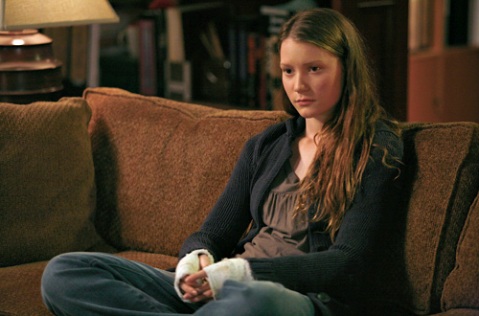
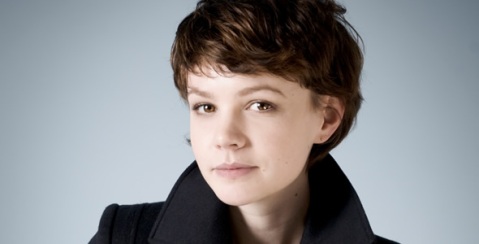
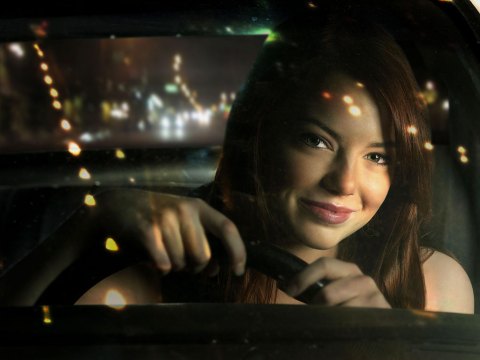
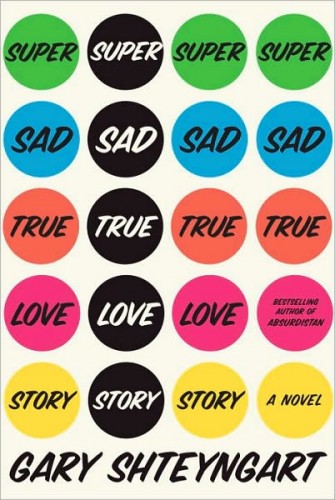
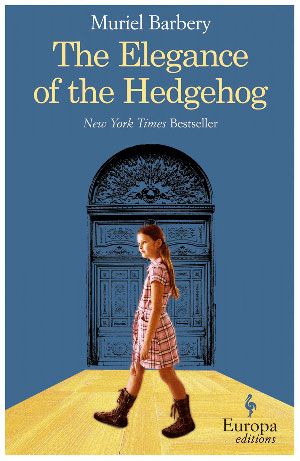 I’ve plunged myself into Muriel Barbery’s wonderful novel, The Elegance of the Hedgehog, which moves back and forth between the interior monologues of two brilliant women: the autodidact Renée, who hides behind her mask as an unkempt, sullen concierge in an elegant Paris apartment building; and Paloma, the precociously intelligent 12-year-old who lives upstairs and despises the pretentions of her family, teachers, and classmates. They seem to be on a path to discover one another — but I’m at the point in the novel when I’m so enjoying just listening to them think out loud that I’m not sure I care whether the narrative goes anywhere (Paloma has a diatribe about why grammar is about accessing the beauty of language that’s so wonderful I’m thinking of plagiarizing it for use in my classes).
I’ve plunged myself into Muriel Barbery’s wonderful novel, The Elegance of the Hedgehog, which moves back and forth between the interior monologues of two brilliant women: the autodidact Renée, who hides behind her mask as an unkempt, sullen concierge in an elegant Paris apartment building; and Paloma, the precociously intelligent 12-year-old who lives upstairs and despises the pretentions of her family, teachers, and classmates. They seem to be on a path to discover one another — but I’m at the point in the novel when I’m so enjoying just listening to them think out loud that I’m not sure I care whether the narrative goes anywhere (Paloma has a diatribe about why grammar is about accessing the beauty of language that’s so wonderful I’m thinking of plagiarizing it for use in my classes).







